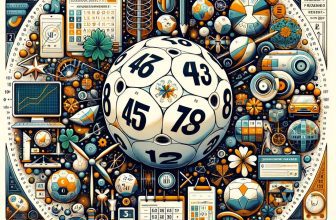Lotteries... For some, this word evokes nostalgic memories of old paper tickets and that very "TV" where a cheerful presenter spun a drum with balls. And for others, it is associated with modern online platforms, instant draws and bright pop-up banners. But what do we have now, and most importantly - where is this industry heading in 2025? And what kind are there anyway? "new lotteries"?
Let's dive into the history of lotteries together, look at their evolution and, of course, squint into the future.
Content
- A Brief History of Lotteries: From Ancient Times to the Digital Age
- Why are lotteries still popular?
- Lotteries 2025: What's New and Why It's Interesting
- Funny examples and unexpected facts
- Innovative pranks: what are they?
- Pros and cons of modern lotteries
- Lottery Myths We Still Believe
- How to choose a reliable lottery
- Prospects for the development of lotteries in 2025
- Some tips for those who want to participate in the lotteries of the future
- Conclusion
A Brief History of Lotteries: From Ancient Times to the Digital Age
To understand why in 2025 we are talking about at all "innovative sweepstakes", we must first look at where it all began.
-
Ancient China and Rome. It is believed that the first lotteries were held in ancient times. According to one version, in China (around the time of the Han Dynasty), lotteries could be used to finance public projects, such as the Great Wall of China. In the Roman Empire, Nero is said to have also liked to play something similar to lotteries to amuse the public. However, there it was more like “free” prize distributions for entertainment purposes.
-
European Middle Ages. In Europe, lotteries began to actively develop in the Middle Ages. City dwellers happily bought tickets, hoping that they would get a piece of land or even a whole house. Part of the money went to charity and municipal needs - so it can be said that lotteries already had a social mission.
-
Classic national lotteries. Over time, each country tried to launch its own state lottery to replenish the treasury. In France, England, Spain and other countries, lotteries appeared where prizes could be both money and valuables. The word "lottery" itself has been in the Russian language for quite a long time - and for many it has always meant "happiness that can fall from the sky."
-
The Age of Television. In Russia, lotteries became a mass entertainment when Gosloto, Russian Lotto and other shows with barrels and balls were shown on TV. People gathered around the screens, marked the numbers on their tickets, and if the right number came up, the whole family rejoiced. The atmosphere was almost festive - after all, everyone dreamed of becoming the owner of a big win.
-
Online lotteries. With the advent of the Internet, everything began to change: tickets could now be bought without leaving the couch. Websites emerged where draws were held in real time, and the results were published instantly. Thus, we approached the era of digital lotteries, which promises to reach a new level in 2025.
Why are lotteries still popular?
Many people ask themselves: “Are lotteries still relevant in the age of high technology and entertainment?” Oh yes, and how! Firstly, lotteries — is a kind of dream about quick and easy riches. Even if we understand that the chance to win is microscopically small, an inner voice whispers: "What if you are the lucky one?"
Secondly, lotteries do not require any special skills from the player. If in poker you need to learn combinations, in betting - to understand sports, then here everything comes down to buying a ticket or choosing numbers. The system will do the rest. This is available to everyone, from students to pensioners.
Thirdly, lotteries have a long cultural and historical legacy. In many families, buying lottery ticket on a holiday is a tradition. Let's remember at least the New Year's pranks, when people wait with bated breath to see who will be the lucky one. And although most leave with a consoling "Thank you for participating", people still come back for a new dose of adrenaline.
Lotteries 2025: What's New and Why It's Interesting
Now to the main thing: what do they look like? "new lotteries" в 2025 and why are they called "innovative pranks"? Let's go over the main trends:
-
Digital transformation. Almost all lottery companies have moved online. Tickets can be purchased through a mobile app, and results come as push notifications. And no more searching for a newspaper or waiting for a TV broadcast - everything is on your phone.
-
Instant draws. Remember the paper "instants" where you had to scratch off the protective layer? Now it's all done online. With one click you'll find out whether you've hit the jackpot or are empty-handed. Thanks to random number generation algorithms, it all happens quickly and transparently (at least that's what the organizers say).
-
Global Super Prizes. The Internet has erased borders, and now you can participate in lotteries in other countries without leaving your home. Therefore, the prize funds of some lotteries will become even bigger by 2025Thousands, if not millions, of participants from all over the world gather, and one (or several) lucky people take away “the whole pot.”
-
NFT and Blockchain. Yes, yes, blockchain has reached lotteries. Some platforms are implementing distributed ledger technology to eliminate the possibility of fraud and increase player confidence. And then there were NFT tickets, it seems a useless thing, but fashionable and youthful. Example: you buy an NFT token that participates in a drawing. If the token wins, its owner gets a prize, and the NFT itself can be resold. Complicated? But how it sounds!
-
Social and environmental lotteries. New wave: part of the collected funds goes to charity or environmental projects. Win or not - in any case, you contributed to a useful cause. Such formats have become popular because people want not only to "play", but also to support something good.
Funny examples and unexpected facts
To make the article not only informative but also funny, I will give a couple of stories:
-
"Vampire Numbers". Once upon a time there was a case when similar combinations of numbers appeared in one lottery three times in a row. Players dubbed them "vampire numbers", supposedly they "drink blood" from those who bet on other combinations. Of course, it was just a coincidence, but a sea of myths and legends were born around this "coincidence".
-
Winning Live. Once on American TV, a lottery host was so happy that he himself had allegedly won the jackpot that he started dancing without waiting for the official announcement of the results. It turned out that he had misread the numbers. The story instantly spread across social networks, and the poor host then apologized for a long time. But the show was unforgettable.
-
Lottery fetishes. Some players believe that if you buy a ticket at a “lucky” box office (for example, next to a church or maternity hospital), then chances of success increase. Others smear the ticket with hand cream to make it “softer and more favorable.” Psychologists say that all these rituals do not affect the results, but they calm the player and reduce anxiety. So, if someone walks around the lottery kiosk three times counterclockwise before making a purchase, do not interfere, the person has his own “secret” methods.
Innovative pranks: what are they?
Under "innovative pranks" most often understand lotteries that use modern technologies and non-standard mechanics. Here are some examples:
-
Augmented Reality (AR) Lotteries. Imagine that you launch an app on your smartphone, point the camera at a lottery ticket, and a virtual animation appears in front of you, showing whether you have won or not. This not only increases interest, but also provides scope for marketing: “Find hidden tickets on the map of your city using AR, and you will have an additional chance to win!”
-
Gamification. Some companies turn the purchase of lottery tickets into a whole game. For example, to get a ticket, you need to go through a mini-quest, answer questions or complete tasks. As a result, the user gets a sense of involvement and excitement. After all, he is not just buying a piece of paper, but participating in an adventure.
-
Crossover with computer games. In 2025, no one will be surprised by a lottery built into a popular online game. For example, in some "global RPG" you can buy a "chest of luck" for real currency, and it participates in a drawing for real money. Or, conversely, the winnings come in the form of in-game resources, which can then be sold on the stock exchange. The line between the virtual and real economies is erased.
-
Social lotteries in messengers. Imagine a chatbot in Telegram or WhatsApp that invites you to participate in a drawing right in the chat. You send the bot the command “Buy a ticket”, receive a digital number, and then wait for the result. Everything is simple and fast. Such “instant” lotteries are becoming especially popular among young people who value speed and convenience.
Pros and cons of modern lotteries
To be objective, we need to mention the shortcomings as well. Because everything new and technological does not always mean “perfect”.
Pros:
- Convenience and accessibility. No need to go to a kiosk or wait for a TV broadcast.
- Large prize pools due to global audience.
- Transparency (if blockchain or other open technology is used).
- A variety of formats: from classic pranks to AR quests.
Cons:
- Risk of running into scammers, especially online.
- Difficult for those who are not friendly with technology (older people may get confused).
- Potential dependence: if it is easier to buy a ticket, then spend money You can play the lottery more often.
- Lack of “romanticism” and traditional atmosphere (many people still like to buy a paper ticket and wait until it is “punched” at the box office).
Lottery Myths We Still Believe
Now that "lotteries 2025" are making leaps and bounds towards innovation, while some players continue to believe in funny myths:
-
"If you haven't won for a long time, then luck will soon come"In reality, each draw is independent from the previous ones, and the chance of winning (or losing) remains the same. But we love to look for patterns and "winning periods".
-
"Buying a ticket for luck". Some people think that if you buy a ticket in a “special place” or at a “special time”, then probability of winning will increase. Alas, random number generators they don't know about it.
-
"Dreams predict numbers". There are people who interpret dreams: "I dreamed of a dove - it means I should bet on the number 8" or "I saw the number 13 in a dream - I urgently take a ticket with 13 in the number." Sometimes this works, but only according to the law of large numbers and a happy coincidence.
-
"Online lotteries are scams". In fact, there can be fraud in offline lotteries too, if the organizer is dishonest. And on the Internet there are honest projects with results verification and open data. It is only important to choose proven sites.
How to choose a reliable lottery
If you want to participate in "innovative sweepstakes", but are afraid of falling for scammers, here are some tips:
- Check your licenseSerious lottery companies have a license in their country or international certificates.
- Read reviews. Forums, social networks and specialized sites - all this will help to understand how much players trust a particular project.
- Explore the site. Pay attention to the design, contact information, and the presence of a privacy policy. Dubious sites often look "collective farm" and do not provide any official information.
- Don't be fooled by unrealistic promises. If you are promised a 100% win or told that a prize is guaranteed for every second person, this is a warning sign that you may be being scammed.
- Try demo modes. Some sites give you the opportunity to play in a test format so that you can evaluate the mechanics of the draw.
Prospects for the development of lotteries in 2025
So, we come to the main question: What awaits lotteries in 2025 and further?
- Growth of the online segment. The number of offline points with paper tickets will decrease, but digital sales will grow. People will get used to the fact that they can buy a ticket in a couple of clicks.
- Integration with other entertainment. Already now, lotteries are being “crossed” with eSports, video games, and show programs. I think that in 2025, these “hybrids” will become commonplace.
- New formats of raffles. We may see even more unusual projects: lotteries based on weather forecasts, lotteries in virtual reality, and also some “ecological lotteries” where each ticket plants a tree in the real world (why not?).
- Strengthening regulation. States will try to control digital lotteries to prevent fraud and protect players. New laws, tax rules may appear, and this will affect the work of companies.
- Major international lotteries. Imagine people from dozens of countries participating in one super-draw. The prize fund reaches astronomical amounts, and the winner becomes a real legend. Technically, this is already possible, all that remains is to settle the legal nuances.
Some tips for those who want to participate in the lotteries of the future
- Set limits. The lottery is fun, but you shouldn't spend all your savings on it. Set a limit on how much you can afford to lose and stick to it.
- Don't trust "super strategies"There is no magic formula for success in random lotteries. Don't waste your money on "guaranteed methods" from dubious "gurus".
- Explore innovation. If the lottery uses NFT, blockchain or AR, learn how it works. The more you understand the mechanics, the less likely you are to be misled.
- Play with positivity. Don't think of the lottery as a way to solve all your financial problems. Let it be entertainment that lifts your spirits, not a cause of stress.
- Share the joy. If you win, don't be afraid to tell your friends (well, maybe with the exception of some crazy amounts, so there's no envy or unnecessary questions). And if you don't win, treat it with humor and move on with your life. You haven't become worse from this, have you?
Conclusion
Lotteries 2025 — it’s no longer just “buy a ticket and wait for a miracle.” It’s a whole world where classics and cutting-edge technologies, paper tickets and digital applications, random numbers and blockchain algorithms are mixed. "New lotteries" are becoming more creative, introducing gamification and social elements, and "innovative pranks" allow players to feel like they are part of a global game where everything is possible.
Of course, we must not forget about a reasonable approach and safety. But if you know how to say "stop" in time and do not perceive the lottery as the only chance for success in life, then, most likely, you will get a lot of positive emotions from it. After all, each ticket is a small hope for a miracle, which has accompanied us from ancient times to the present day.
I hope you found my article informative and not too boring. If you liked it, share it with your friends, leave comments and, of course, don't forget to check out the world "lottery 2025" — maybe that’s where luck (or at least a new dose of good mood) awaits you!
May your life be bright, and may your winnings be more frequent than the weather forecast promises sunny days! And remember: the lottery is a game, and games are created for us to have fun, not to suffer. So play responsibly and always with a smile on your face!




